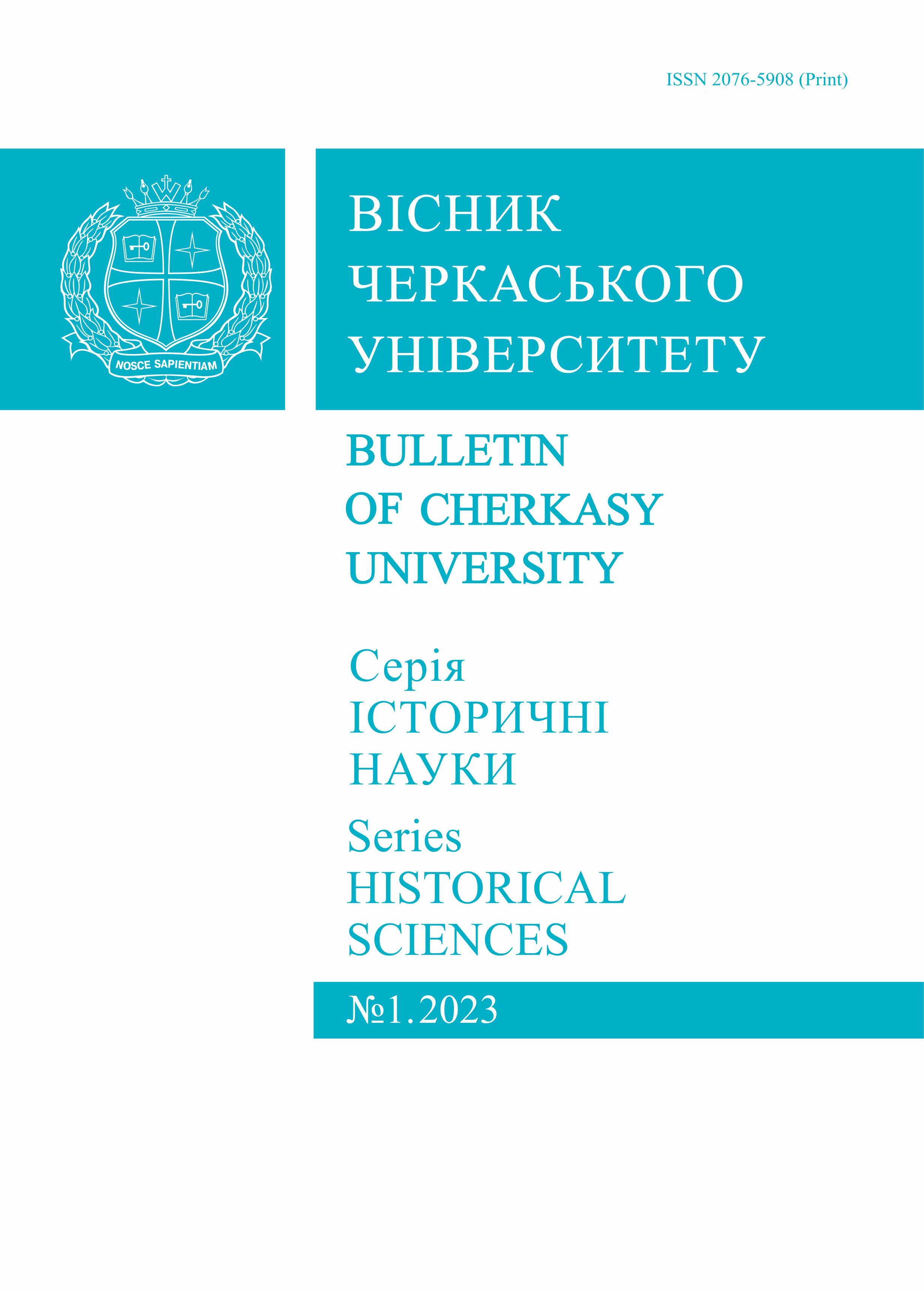Formation of experience: the phenomenological aspect of historical reality
Main Article Content
Abstract
Abstract. The article examines the problems of transformation of basic approaches to historical reality, historical narrative, historical discourse. The phenomenon of historical reality is interpreted from the perspective of the phenomenological tradition in Western philosophy of the 20th century.
The purpose of the article is to outline the modern transformations of the phenomenological issues of experience formation in accordance with historical knowledge and discourse, as well as linguistic mechanisms of the formation of the world picture.
The scientific novelty of the research results consists in outlining the cognitive potential of using the phenomenological approach to the historical narrative and the corresponding system of discourses in the context of the search for humanitarianism in the first quarter of the 21st century.
Conclusions. Phenomenological methodology and guidelines for overcoming the limitations of the subject-object dichotomy in humanitarianism in general and in the philosophy of history in particular are quite relevant. The heuristically interpreted category of experience is universal regarding the perception of historical reality by a cognitive agent. The psycho-affective sphere of consciousness and social emotions can be considered as a trigger for a phenomenological approach to historical narratives, discourses and language practices. Experiencing and making sense of history within consciousness has a symbolic character, and historical experience is conceptualized in narrative and discourse. The phenomenological vision of historical reality as a component of individual and collective consciousness, collective imagination and public opinion is quite promising. The phenomenological approach is relevant not only for public history and the collective memory of society, but also for the transformation of history as an academic discipline. Also important is the phenomenological experience of historical reality for the formation of identities at all levels, as well as resistance to post-truth techniques within the modern media space as a horizon of meanings of a modern person in conditions of digitalization.
Article Details
References
References
Habriielian, O. A. (2010). Filosofiia istorii. [Philosophy of history] O. A. Habriielian, I. I. Kalnoi, O. P. Tsvietkov. K. : Akademvydav. [in Ukrainian].
Huserl, E. (2021). Kartezianski medytatsii. Vstup do fenomenolohii. [Cartesian Meditations. Introduction to phenomenology]. K. : Tempora. [in Ukrainian].
Kozellek, R. (2005). Mynule maibutnie. Pro semantyku istorychnoho chasu. [The past is the future. On the semantics of historical time]. K. : Dukh i Litera. [in Ukrainian].
Kolesnyk, I. (2019). Hlobalna istoriia. Istoriia poniat. [Global history. The history of concepts]. K. : NAN Ukrainy; Instytut istorii Ukrainy. [in Ukrainian].
Pavlenko, Yu. V. (2005). Istoriosofiia. [Historiosophy]. Entsyklopediia suchasnoi Ukrainy [Encyclopedia of modern Ukraine] ; redkol.: I. M. Dziuba, A. I. Zhukovskyi, M. H. Zhelezniak ta in. ; NAN Ukrainy, NTSh. K. : Instytut entsyklopedychnykh doslidzhen NAN Ukrainy. URL: https://esu.com.ua/article-12819 [in Ukrainian].
Petrenko-Tseunova, O. Chomu istoriia – na chasi? Poiasniuiut naukovtsi. [Why is history timely? Scientists explain]. Tyzhden. 2022. 19 lypnia. URL: https://tyzhden.ua/chomu-istoriia-na-chasi-poiasniuiut-naukovtsi/ [in Ukrainian].
Riuzen, Y. (2010). Novi shliakhy istorychnoho myslennia. [New ways of historical thinking]. Per. z nim. V. Kamianets. Lviv : Litopys. [in Ukrainian].
Sklokin, V. (2009). Franklin Ankersmit – teoretyk ryzykovanoi istoriohrafii. [Franklin Ankersmit is a theoretician of risky historiography]. Ukraina Moderna. № 15. S. 237–245. [in Ukrainian].
Boddice, R. (2017). The History of Emotions : Past, Present, Future. Revista de Estudios Sociales, No. 62. Рp. 10–15. DOI: https://doi.org/10.7440/res62.2017.02 [in English]
Carr, D. (2014). Experience and History : Phenomenological Perspectives on the Historical World. Oxford, Oxford University Press. [in English]
Carr, D. (2021). Historical Experience. Essays on the Phenomenology of History. London : Routledge. [in English]
Jalava, M. (2019). Emotions in Historiography : The Case of the Early Twentieth-Century Finnish Community of Historians. História da Historiografia. Vol. 12, no. 31, Pp. 113–143. DOI: https://doi.org/10.7440/res64.2018.03 [in English]
Kivimäki, V., Suodenjoki, S., Vahtikari, T. (2021). Lived Nation : Histories of Experience and Emotion in Understanding Nationalism. In: Kivimäki V., Suodenjoki S., Vahtikari T. (eds) Lived Nation as the History of Experiences and Emotions in Finland, 1800-2000. Palgrave Studies in the History of Experience. Palgrave Macmillan, Cham. https://doi.org/10.1007/978-3-030-69882-9_1 [in English]
Kokko, H., Harjula, M. (2023). Social History of Experiences: A Theoretical-Methodological Approach. Іn book: Experiencing Society and the Lived Welfare State. Ed.: P. Haapala, M. Harjula, H. Kokko. Palgrave Macmillan Cham. Рp.17–40. [in English]
Kretov, P. V., Kretova, O. I. (2021). Anticorrelationism cluster and performative narrative. Philosophy, Economics and Law Review. Vol. 1, no. 2. Pp. 7–17. [in English]
Kretov, P., Kretova, О. (2017). Symbolic landscape of consciousness : man between representationalism, functionalism and relativism. Anthropological Measurements of Philosophical Research. № 12. С. 40–49. DOI: 10.15802/ampr.v0i12.119122. [in Ukrainian].
Loidolt, S. (2021). Order, Experience, and Critique : The phenomenological method in political and legal theory. Cont. Philos. Rev. Vol. 54. Pp. 153–170. [in English]
Nagy, P. (2008). Historians and Emotions : new theories, new questions. Hypotheses. 24 Oct. URL: https://emma.hypotheses.org/147 [in English]
Ortega-Sánchez, D., Blanch, J. P., Pérez-González, С. (2020). Emotions and Construction of National Identities in Historical Education. Education Sciences. no. 10 (11): 322. https://doi.org/10.3390/educsci10110322. [in English]

